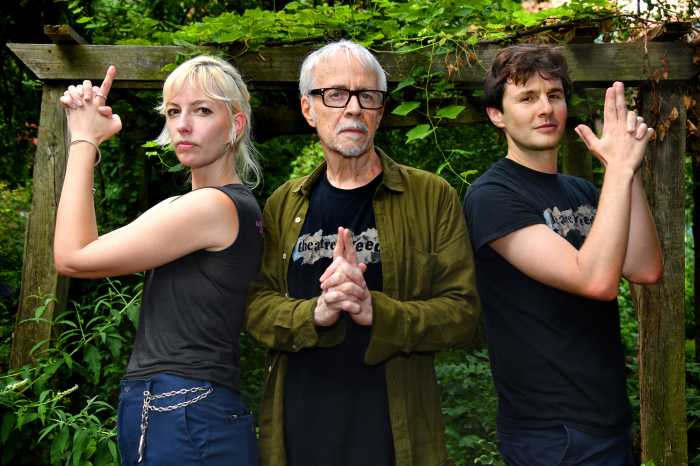By Chad Smith
The Recording Industry Association of America may have stepped up its efforts against music piracy in recent years, but many New York University students still don’t seem ready to step down their downloading.
In fact, if the 33 individual lawsuits the R.I.A.A. has served N.Y.U. students since September 2003 sought to deter students from illegal file sharing, few students in Washington Square last Monday seemed deterred.
For the R.I.A.A. and its online war against those sharing music illegally, the N.Y.U. campus is just another front. The industry says illegal sharing networks pose a pernicious threat to the music business, but these networks are a phenomenon from which many N.Y.U. students cannot wean themselves. Neither side is backing down.
“I’ve heard of the lawsuits but I still download songs. I’m not worried,” said N.Y.U. sophomore Sean Goldhammer. He isn’t alone. Of the 11 students who spoke with The Villager, eight said that they downloaded illegally, but all 11 said they knew someone who does.
“Oh, illegal downloading is rampant,” said freshman Arastoo Taslim, an international studies major.
Taslim doesn’t personally use the outlaw networks, but he, like many students at the Greenwich Village university, believes sharing music files on computer networks like Kazaa or Ares — networks where anyone can log on and illegally download copyrighted music for free — isn’t as bad a crime as, say, shoplifting. Record companies, he said, are greedy, and he feels little sympathy for a corporate culture now made vulnerable.
“Record labels exploit the artists,” Taslim said. “If we thought the money was going directly to the artists, I’m sure people wouldn’t download as much as they do.”
Record companies take out large percentages for distributing artists’ work — a band can expect an average of $1 in royalties for each full-priced $17 CD sold, according to Michael McCready, a copyright lawyer who represents musicians. Nevertheless, illegally sharing songs hurts the music business, says Jenni Engebretsen, R.I.A.A. spokesperson.
Since 1999, the year Napster, one of the first and probably most widely known, music-sharing programs, changed the face of digital music and redefined the meaning of song ownership, shipments of CD’s and other products to record stores are down nearly 30 percent, said Engebretsen.
“That decline has taken a tremendous toll on the music community as a whole — from thousands of layoffs to songwriters out of work and new artists just not getting signed,” she said.
Still, some at N.Y.U. are skeptical.
“It really isn’t clear that artists are suffering at all,” said Fred Benenson, an N.Y.U. graduate and president of Free Culture N.Y.U. Free Culture is a group at the university that champions the rights of musicians and those who are pro-file sharing, rallies against big-industry “exploitation” and looks for ways to lobby for reform on stringent copyright laws.
“Aside from a disastrous attempt by Metallica a few years ago to convince their fans that they [Metallica] were really the victims of peer-to-peer networks, I don’t think that artists really are all that disenfranchised,” Benenson said, in reference to one of the few times that musicians themselves have protested the issue.
Benenson, like many N.Y.U. students, also said that he was upset that the recording industry has singled out his alma mater in suits. Josh Taylor, an N.Y.U. spokesperson, agreed in some respects.
“As a university, of course we put high value on intellectual property,” said Taylor. “That said, we think that the record labels should perhaps find other means, rather than targeting N.Y.U. students, to try and solve such problems.”
The university’s getting singled out for lawsuits, however, may be a misconception. R.I.A.A. has sued 1,062 students at 131 other universities since September 2003, said Engebretsen. And, although 33 of the 261 people sued in New York City were students at N.Y.U., R.I.A.A. has sued 17,800 people in total for illegal music downloading.
While some colleges and universities — such as those in the State University of New York system — block students using their campus networks from accessing illegal file-sharing programs, N.Y.U. has, thus far, chosen not to take this route. N.Y.U. administrators note that programs such as Kazaa and Ares have several legal uses, so cutting them out of the student network would be counterproductive.
Meanwhile, the recording industry will continue to sue until the illegal sharing networks are eradicated, Engebretsen said. The R.I.A.A. has settled 26 of the 33 suits at N.Y.U., but Engebretsen wouldn’t say for how much — it has been reported that the figure is usually between $12,000 and $17,000. By settling outside court, students are spared from having to pay astronomical penalties should the cases go to trial.
However, Engebretsen hopes that the increasing popularity of Apple’s iTunes and other legal downloading options will counterbalance the illegal file sharers. With iPod’s popularity, “it’s no longer worth the risk,” she said, to pirate music.
But even N.Y.U. student Goldhammer had a problem with that argument. “iPods are way overpriced,” he said, “let alone how often they break.”




































